Rental Application Form

Alycia Lucio
November 18, 2019
8 min read
In this article:
- What is a rental application?
- Why do I need a rental application?
- What is the average rental application fee?
- What should I include in a rental application?
- How does the tenant screening process work?
A big part of successfully managing a rental property is finding reliable tenants. And the first step in finding reliable renters is your rental application and screening process. According to the Zillow Group Consumer Housing Trends Report 2019,* 87% of renters submitted at least one rental application before signing a lease. Zillow's online rental application and tenant screening tool — which includes features like third-party background checks and credit screening — is a great way to find tenants for your property.
What is a rental application?
A rental application is a document used by a landlord or property manager to assess prospective tenants who are interested in renting a room, unit or property. It looks at the prospective tenant's:
- Personal information
- Household information
- Residential history
- Employment and income
- Background information
You may be familiar with rental applications in the form of a downloadable PDF. Zillow uses an online rental application that is portable. This means the renter only has to pay once to submit a rental application to an unlimited number of participating landlords within a 30-day period. When applications are completed, they will be available in your Zillow Rental Manager account under the Applications section of your listing.
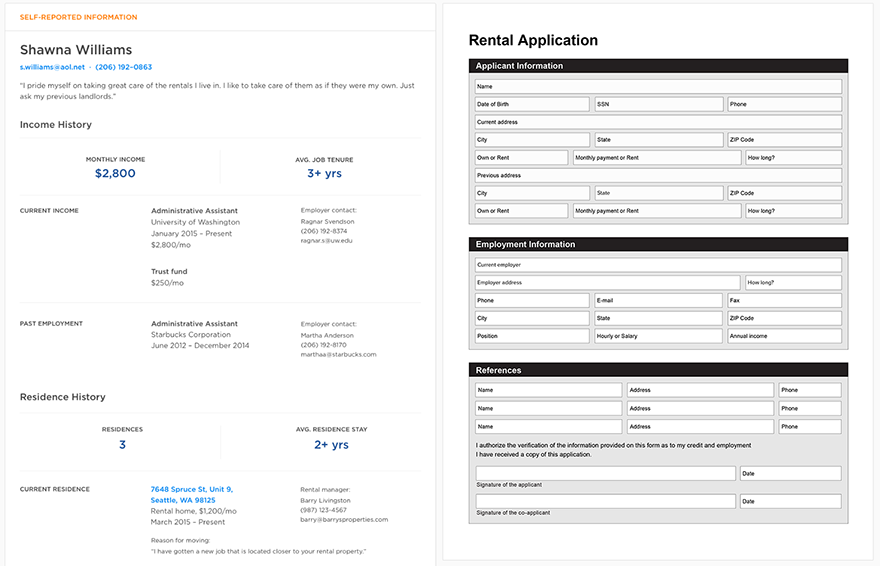
As you review rental applications, it's important to understand and comply with all applicable fair housing laws. These laws prevent discrimination due to race, religion, ethnic background or nationality, gender, age, family status, disability and more.
Why do I need a rental application?
The rental application and tenant screening process (including criminal and background checks) provide critical information about the renter’s background and history. By looking at income and other financial conditions, you can feel assured that the applicant will be able to pay rent each month.
Do I have to use a rental application form?
While you’re not required to use a rental application form, you should always employ a consistent system to gather and review information about prospective tenants. A rental application form can provide valuable information in an easy-to-review format, whether you're renting a single-family property, apartment, vacation rental or just a room in your house. Zillow Rental Manager offers an easy online rental application and screening process. See how it works:
Does each tenant need to fill out a rental application?
All prospective tenants over 18 years of age should complete their own rental application. If you're renting your property to multiple people, each person can list co-applicants on their tenant application form, but everyone over 18 should also complete their own application.
What is the average rental application fee?
The typical rental application fee among renters who paid one is $50, according to the Zillow Group Consumer Housing Trends Report 2019. Generally, application fees also cover the cost of performing a credit and background check. The fees vary by location — some states allow landlords to charge a market-based rental application fee, and others have a limit on the amount you can charge.
If you're using Zillow's Rental Manager tool, the applicant pays a $35 rental application fee to use the tool for up to 30 days (during which time they can apply to any properties that accept Zillow applications). However much you charge, it's always important to be upfront about the cost.
How are rental application fees collected?
Rental application fees are paid by the renter when they apply. If they're applying online, the fee is usually paid with a credit or debit card. Paper applications may use a credit or debit card, check or money order.
When you use Zillow Rental Manager, you can invite prospective renters to complete the tenant application form online. To send an invitation to apply, go to the Applications tab, click on Send Invite, and enter the applicant's email address.
When should I refund the rental application fee?
Application fees should not be collected before you're ready to run a credit and background check. As a best practice, you should only accept fees from applicants who meet your rental requirements (such as income), and some state or local laws may require you to refund all rental application fees for all applicants who you do not select to be the tenant.
What should I include in a rental application?
Rental applications can include a variety of questions, but make sure to comply with fair housing laws. Whether you're providing a paper or online application, a basic rental application form might include:
1. Personal information
Have the applicant provide enough information so you can properly run background and credit checks and contact them. Common identification factors include:
- Name
- Phone number
- Email address
- Emergency contact details
Note that fair housing laws consider age a protected class, so only ask for an applicant's age if necessary for verifying their identity or if your rental is in an age-restricted community.
Here's what the personal information section looks like on a rental application sample from Zillow’s Rental Manager tool (appearance may vary):


2. Household information
This section is where applicants disclose information like how many people will be living in the home, if they have pets and when they will be able to move in. According to the Zillow Group Consumer Housing Trends Report 2019:
- 53% of rental households include pets: Choosing to allow pets is up to you, but a large percentage of renters immediately pass up a property with pet restrictions.
- 79% of renters live with another person: Make sure all occupants are listed on the application, and have all applicants over 18 complete their own applications as well.
Here's what the household information section might look like on your tenant's application:
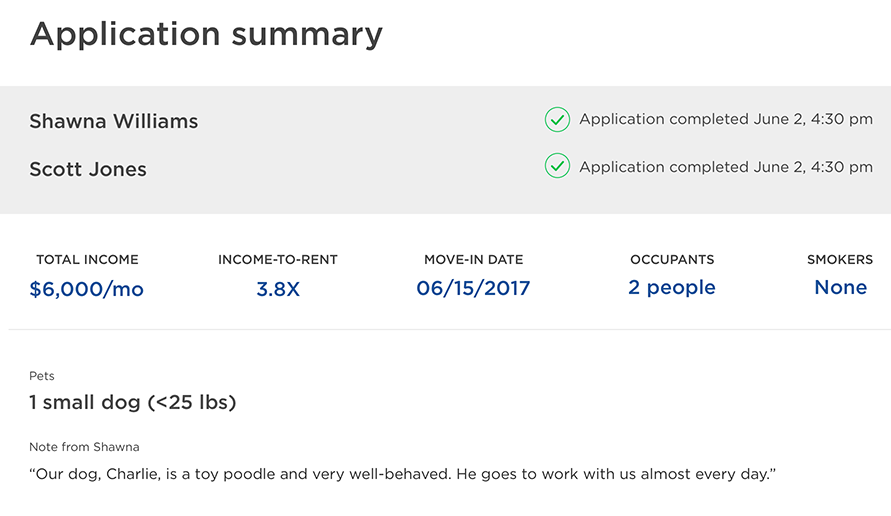
3. Residential history
Applicants are required to provide a residential history for the past three years, including rentals, owned properties and other living situations. You'll want to gather:
- Their current address and any previous addresses in the past three years
- The dates they lived in each residence
- Monthly rent or mortgage payments
- Names and contact information for previous landlords
- Their reason for moving
You can use the previous landlord's contact information as a reference for your applicants — just be sure to let the applicant know you plan on contacting their landlord.
Your residence history section of the rental application might look like this:
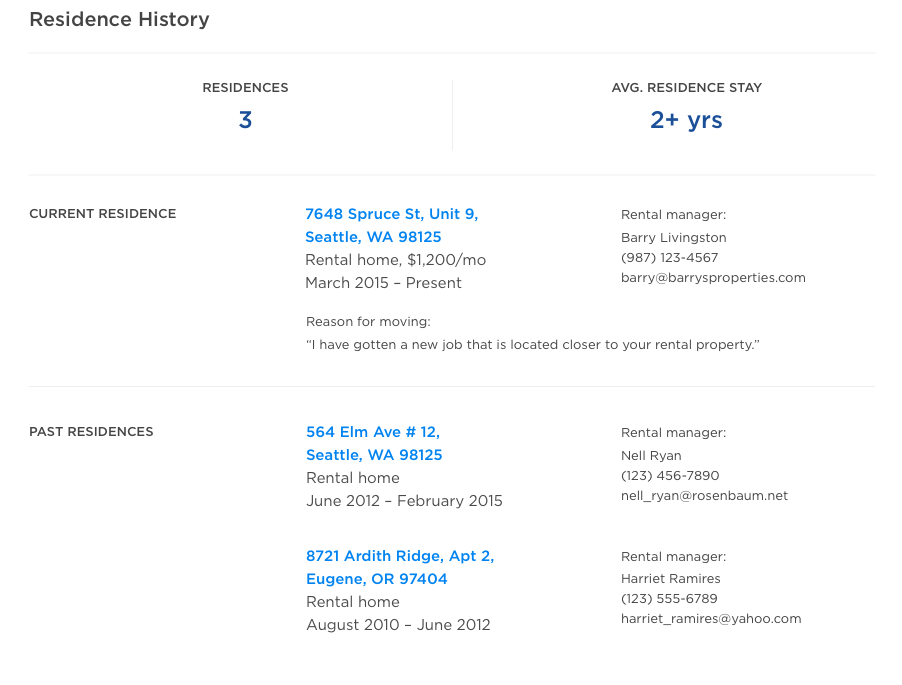
4. Employment and income
It's critical to verify that the applicant will be able to pay rent. This section of the rental application generally requires:
- Current employer's name and address
- Applicant's job title
- Applicant's monthly gross income
- Additional sources of income
- Length of employment
- Supervisor's name, phone number and email address
If the applicant gives their permission, you can contact their current employer to verify this data. It's ideal for applicants to have monthly gross income that's at least three times the monthly rent price, but their past payment history and rent amount may be a better indicator of ability to pay than a strict minimum income requirement.
Here's an example of a completed employment and income history section on a rental application:
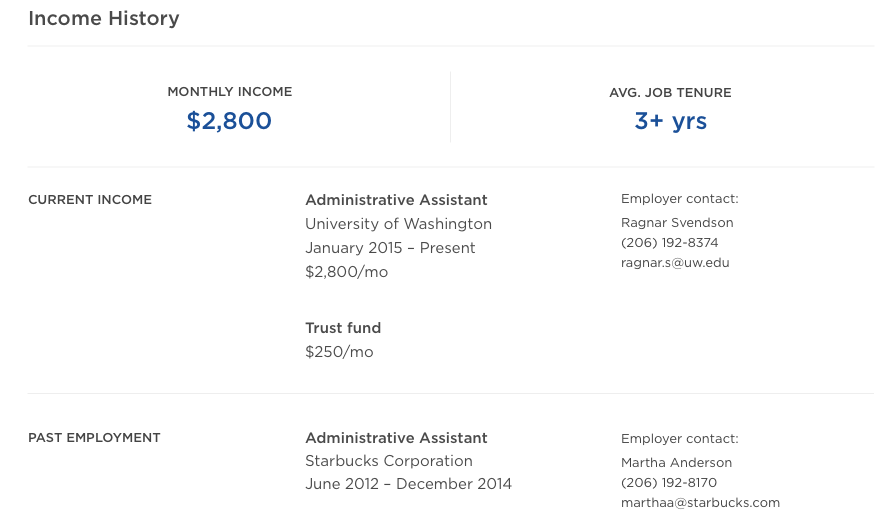
5. Background information
This section asks some yes/no questions about major issues that may affect your decision to accept or deny their application for a home rental. Some questions you might ask, as long as they comply with fair housing laws, are:
- Have you ever filed for bankruptcy in the past seven years?
- Have you ever been evicted from a rental?
- Do you smoke?
6. Disclosure
As a landlord or property manager, you need an applicant's permission to run credit and background checks, as well as to contact their employer and landlord for references. Make sure your disclosure is worded according to landlord-tenant laws and complies with all applicable fair housing laws and the Fair Credit Reporting Act. Your rental application should also include:
- The amount of the application processing fee (and whether it's refundable)
- Holding deposit paid by the applicant and the total holding deposit (if applicable)
- Address of the residence being held (if applicable)
7. Signature and completion date
It’s a good idea to make sure your rental application is signed and dated. This acknowledges that both the landlord and the applicant have read the application and agree to its terms.
Over half (59%) of renters prefer to apply for a rental online — Zillow offers a digital solution that makes it easy to submit rental applications online.
Once an applicant has signed the form, you'll see a summary like this at the beginning of the Zillow rental application:
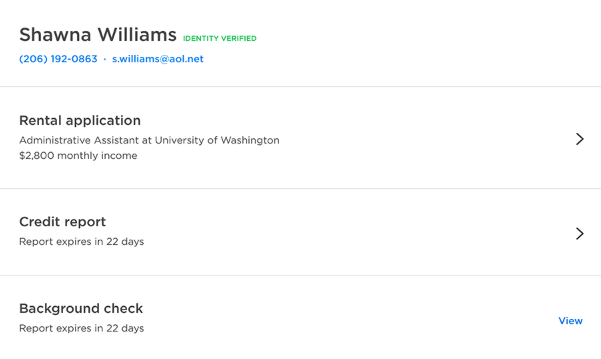
How does the tenant screening process work?
Once all prospective tenants have completed their rental application, you can proceed with the tenant screening process.
- Run a tenant background check: As a landlord, in certain circumstances, you can be liable for illegal activity, violence or disruption that’s caused by your tenants. Zillow uses Checkr to screen applicants — you’ll get results back in minutes. On some rare occasions, a background check can require a manual review, which may take up to 24 hours.
- Run a credit report: Make sure the applicant has enough income to afford rent. A credit report will show if they’re making current payments on time, if they have any prior bankruptcies or evictions, and if their prior residences match what’s on their application.
- Verify employment and income: Call the applicant's employer to make sure their income matches what's on the application. You can also request the applicant's most recent pay stubs.
- Call former landlords to verify rental history: You should ask their current or former landlord if the applicant paid rent on time, took good care of the property and whether the landlord would rent to them again.
- Select an applicant: Fair housing laws prevent discrimination based on several protected classes, so make sure you're complying with federal, state and local laws when you decide to accept or deny an applicant.
- Create a rental lease agreement: This will outline the terms of the rental and any policies and requirements. Send the rental agreement along with a summary of amounts due at signing, if applicable.
For more articles, tips and trends, visit our Rentals Resource Center.
*Zillow Group Consumer Housing Trends Report 2019 survey data
Connect with us!
Learn how Zillow Rentals can help you reach your goals.
Stay informed. Stay ahead.
Access exclusive industry insights, market trends, and expert tips. Subscribe now to receive quarterly Zillow Rentals newsletters!